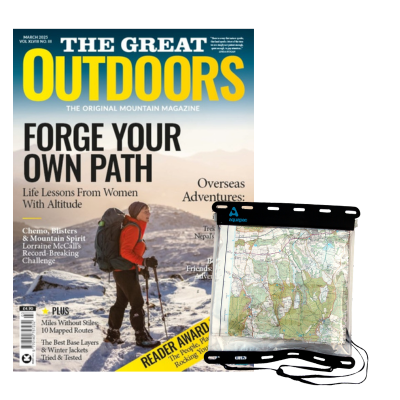Devastation, anger – and a determination to resist. Seven outdoor enthusiasts reflect on their connections to Dartmoor and react to today’s high court decision overturning the right to wild camp there.
Today the high court ruled in favour of a wealthy landowner and revoked wild camping rights on Dartmoor, the last place in England where there was an assumed right to wild camp.
Here, seven outdoor enthusiasts with past experiences of wild camping on Dartmoor tell The Great Outdoors what their connection to this ancient landscape means to them – and how they feel about the verdict.
Phoebe Smith, author of Extreme Sleeps: Adventures of a Wild Camper
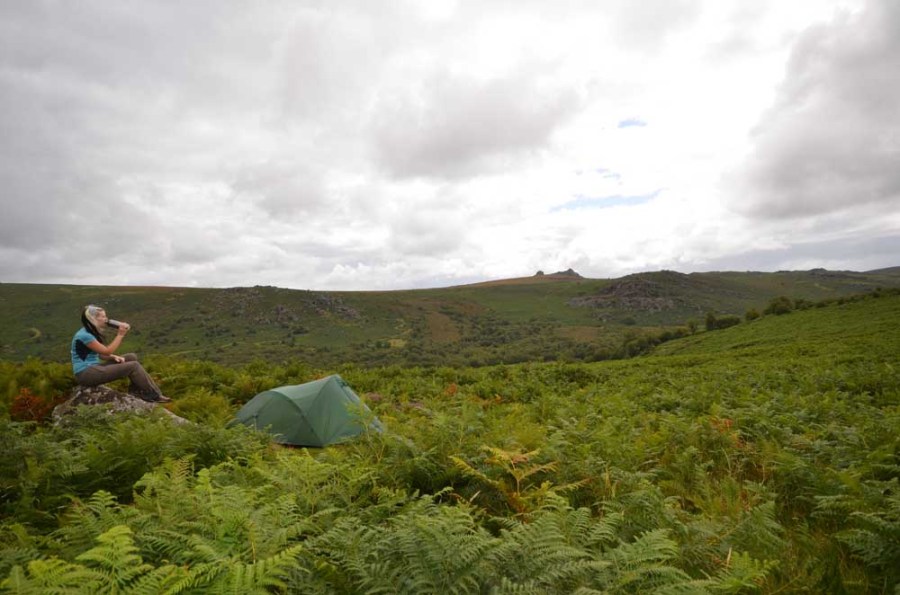
Phoebe wild camping on Dartmoor. Photo: Phoebe Smith
For my entire lifetime Dartmoor has been a place I’ve associated with freedom. Its weather-scoured tors, ancient stone rows and endless, pathless opportunities have not only be accessible by train, but also allowed me to go and wild camp without the worry that anyone has the right to move me on.
It has been the place that I’ve taken or sent countless newbies – from families eager to give their children the first taste of the wild and teach them responsible leave no trace camping, to middle-aged hillwalkers only just getting into the activity and are eager to ensure no laws are broken, and solo women already concerned about taking a leap into wild camping by themselves and don’t want the added stress of potentially being asked to move on. Yet today all that has come to a devastating end.
The high court has ruled that our much-documented right to wild camp that was believed to have been enshrined on law never actually existed. The whole case hinged on technicality, whereby the millionaire landowner of Stall Moor, Alexander Darwall – who owns an area in the National Park twice the size of Gatwick Airport – maintained that wild camping was not a ‘recreational activity’ which the 1985 Dartmoor Commons Act covered. Though, apparently, shooting the deer and pheasants which he grazed on his land – and was worried us wild campers might disturb – is. And the High Court Chancellor, Julian Flaux, agreed.
Not only am I devastated for all the Duke of Edinburgh students, Ten Tors Challengers and disadvantaged young people for whom this is their only way to experience immersion into nature, but I am heartbroken for what this could mean elsewhere. A whole generation of wild campers – who, let’s be honest, are the ones who love the environment and nature more than anyone – is about to be lost, and all because of greed.
We’ve been ruled by a government that has criminalised trespass and sold off record amounts of public land and now we are being told that we are criminals once more if we dare to pitch a tent on the only place in England and Wales where we could. Fighting is now our only option.
Hanna Lindon, outdoor and environmental writer

Hannah Lindon wild camping on Dartmoor. Photo: Hanna Lindon
There are slim pickings in southern England for those of us who love wild places. In the South and North Downs, in the Chilterns, the Cotswolds, the New Forest and in other pockets of verging-on-natural beauty, walkers are hemmed in by rules and restrictions. We’re channelled into a narrow network of paths, relieved by the occasional (and pretty poorly advertised) pool of access land. Pity us, Scottish folk, with your right-to-roam-enabling Land Reform Act, because here the public only have access to about 8% of the countryside. And even in that 8%, we’re denied the privilege of sleeping free beneath the stars.
That’s what makes Dartmoor so special. Thanks to a liberal byelaw in the 1985 Dartmoor Commons Act, there’s free access for all “to all the commons on foot and on horseback for the purposes of open-air recreation.” It’s always been assumed, by everyone from the Dartmoor National Park Authority to the national park’s big landowners, that ‘open-air recreation’ includes wild camping.
Dartmoor was the first place I ever wildly pitched a tent. Despite the bogs and the pretty terrifying folklore traditions, it seemed more accessible than the Lakes and Snowdonia, with their uncertain (or so it appeared to a beginner) toleration of wild camping above a certain height. It was a soggy but splendid stepping stone onto quite literally higher things, spawning a life of meandering around in the great outdoors and a career to match. I’ve returned with tent in backpack many times over the years, including a memorable pregnant camp where the dog stole my rollmat and we greeted sunrise together from atop a tor.
A few weeks ago, I watched pro-wild camping activists protesting outside the high court from the safety of my computer screen. The reason I wasn’t there was because I couldn’t quite believe any reasonable judge would overturn Dartmoor’s historic access tradition. What a mistake. This ruling has made one thing clear: if we want to stop selfish interests impinging upon the few freedoms of access we still have in England, we’ll need to fight for them.
Lucy Thraves, writer and editor
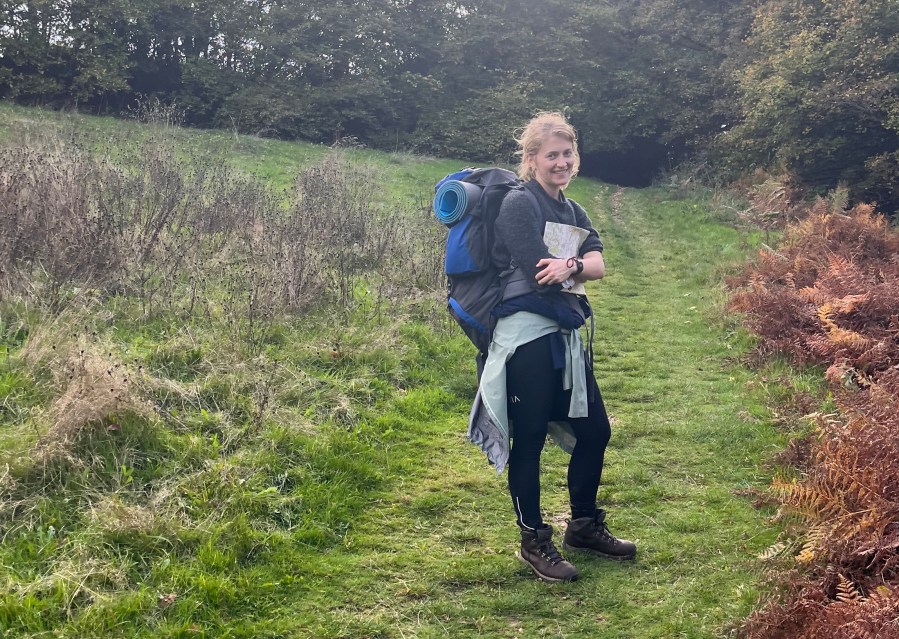
Lucy on the way to wild camp on Dartmoor. Photo: Lucy Thraves
Knowing that the ability to do so legally was under threat, I went wild camping in Dartmoor last September, when the nights were drawing in. Setting off after dark, I remember delighting in that familiar blend of trepidation and dizzying freedom, as you adjust to the darkness and the unknown, and gradually let your surroundings become your home. It’s a feeling I have only ever experienced wild camping.
We found a soft, leafy clearing in a silver birch grove next to a small stream. It was Arcadian: the kind of camping spot you dream of finding but never do, complete with picture-book toadstools. Later on, when we stuck our heads out of the tent, the sky was so full of stars that it was more silver than black.
Dartmoor is surprisingly desolate. It’s all undulating, heathery moor, watched over by strange rock formations that stand like petrified sentinels. We didn’t pass many others, but those we did smiled, and, noting our huge rucksacks, asked us where we were headed for the night. Locals offered advice for good camping spots; fellow visitors remarked on the wild beauty, and (as it became increasingly bad) the weather.
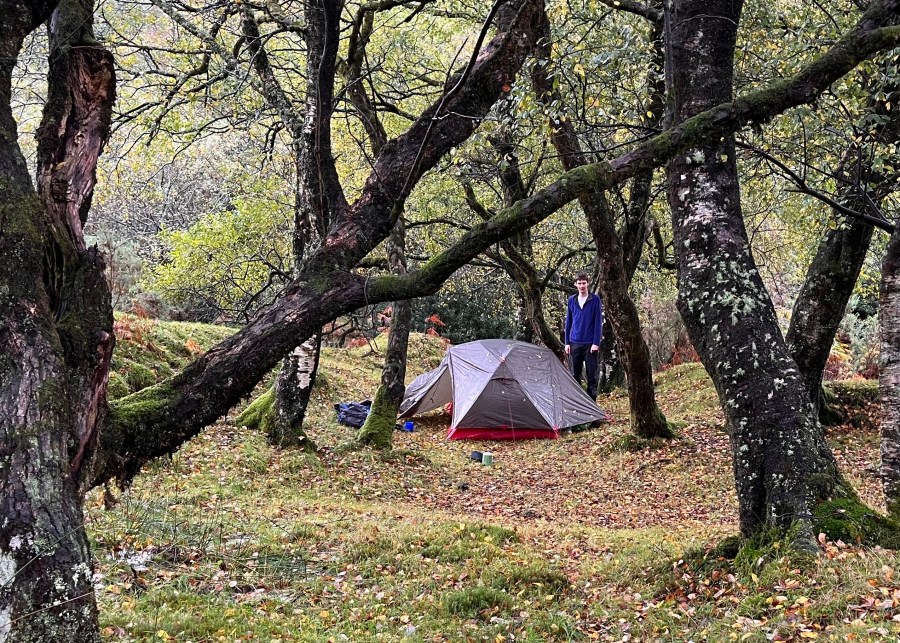
“The kind of camping spot you dream of finding”. Photo: Lucy Thraves
The public’s right to this deep, shared access is being eroded by wealthy landowners, whose interest, whatever they may say, lies solely in protecting and growing their wealth. Hedge fund manager Alexander Darwall, trained to seek out potential for profit like a bloodhound, sees the land as an investment, and the people who use it as risks. Now, wielding his already vast wealth, he has bent the park’s governance to his will.
Wild camping is a practice founded upon shared responsibility, self-awareness, sustainability, and the belief that the land belongs to the people. This is a huge loss for everyone who loves the outdoors, and a devastating triumph of greed.
Ash Routen, adventure and travel writer
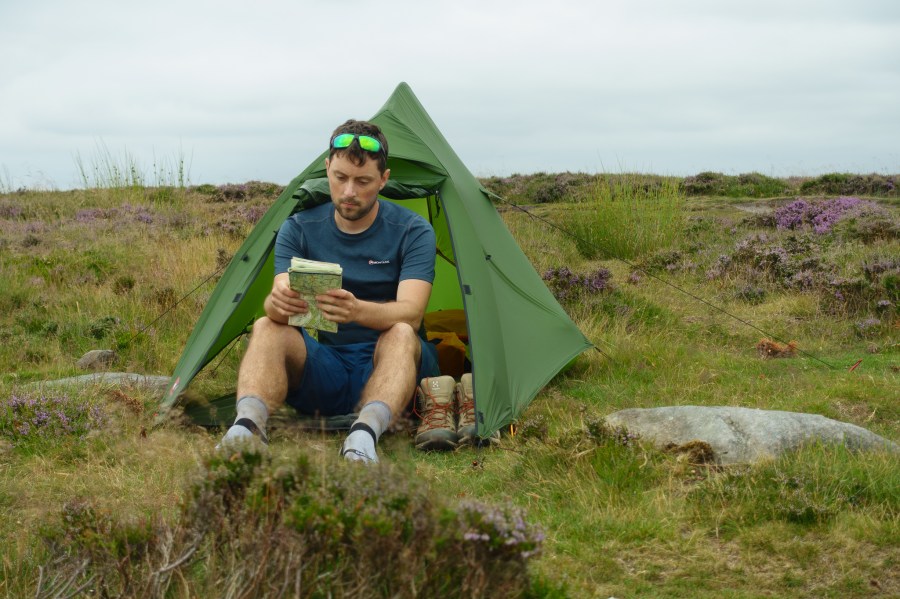
Ash on a recent wild camp in the Peak District. Photo: Ash Routen
Today’s news of the right to wild camp on Dartmoor being overturned by the courts came as a real shock. I had casually read about the ongoing court case last year, but I’m ashamed to admit I hadn’t quite realised the full extent of the consequences. That there could be restriction of one of our sacred wild places is saddening and infuriating.
I lived in Exeter while I was a student at the university, and during that time Dartmoor became a special place to me. By the time I landed there I’d been hiking in the Alps, and places like the Brecon Beacons, so I had enough ‘know-how’ to think about dragging my newly found mates out onto the moor. We would take the bus to Okehampton, walk the few miles to Meldon Reservoir and be out on the hills – Yes Tor, High Willhays and beyond. It was the first experience of the outdoors proper for some of my mates.
We hiked and climbed all across the Moor – the names come rolling back now, Bonehill, Hound Tor, Combestone Tor, Hay Tor, Dewerstone…And it was also where we had our first taste of wild camping. If memory serves right, my first proper wild camp was somewhere after a walk through the magical Tavy Cleave.
That others no longer have the right to respectfully immerse themselves in one of our country’s finest wild places and to have those formative wild camping experiences, is really very sad. I had mulled over a memory lane camp on Dartmoor this year. I think now I owe it to my younger self to follow through with that.
Alex Nail, landscape photographer
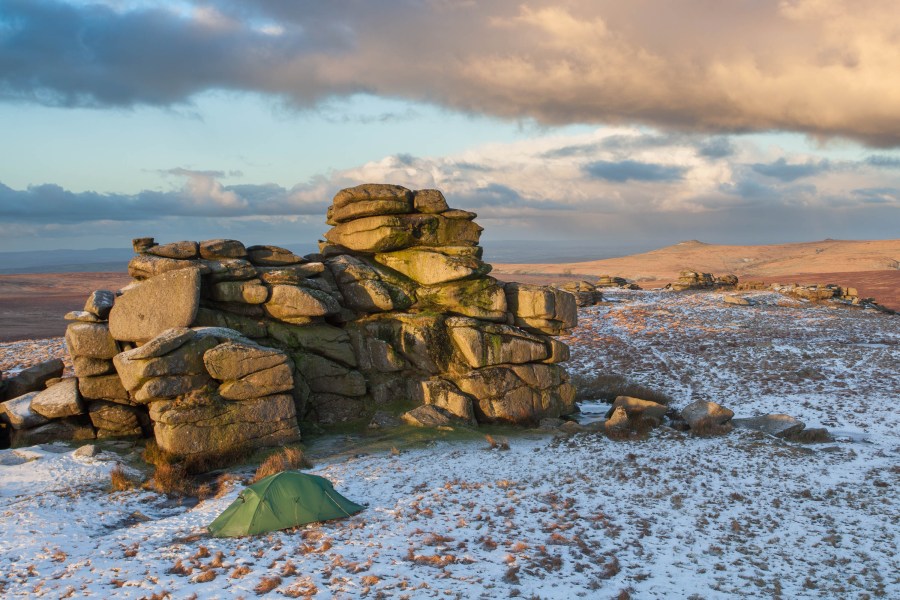
One of Alex’s Dartmoor camps, below Fur Tor. Photo: Alex Nail
In March 2008 I went wild camping on Dartmoor for the first time at the Beardown Man, a 10-foot-tall standing stone. I couldn’t drive, so my only means of getting to more remote parts of Dartmoor from my home in Peter Tavy was to hike, and if I wanted to be there for sunrise, I needed to camp out. I was on my own and under-equipped for what turned out to be a frosty night. I didn’t sleep at all, but the following morning I woke up and photographed the stone in beautiful predawn light. It justified my efforts, but more than that, as I bounded across boggy ground on my way home, I realised I had found something I loved. It was the first of many camps on Dartmoor.
In retrospect this was the fork in the road that ultimately drew me away from a career in engineering to where I am now, a mountain photographer working internationally leading wild camping trips for other photographers. Wild camping started out as a necessity but became the primary way I experience the outdoors.
Reading this baffling high court decision has left me feeling sadness above all else. I have taken hundreds of people wild camping, many for the first time, so I know just what a powerful, enriching experience it can be. By putting further barriers in the way of wild campers we deny the opportunities of others to enjoy Dartmoor as I have and we further sever our connection with nature.
Kirsten Amor, writer and editor
Dartmoor was the first place I’d ever wild camped moving from Florida to the UK at 16, and I just remember having this feeling of wonder and exuberance that you could set up a temporary home in such an ancient landscape.
The wild camping was part of my training for Ten Tors, which helped ignite my lifelong love of hiking. I was also preparing to study archaeology at university at the time, and gazing around Dartmoor’s archaeology when camping gave me a renewed appreciation for how our environment shapes our cultures. It helped me with my university applications and eventual work as an archaeologist.
The court result today is unjust and shortsighted. Looking back on the impact my first time wild camping in Dartmoor had on my future today, it’s outrageous that a select few individuals are going to withhold such an enriching experience from the rest of the population.
Ben, ecologist
My first ever time camping was in Dartmoor three summers ago, during which I swam in the Dart at first and last light each day (I’ve now done the same trip every summer since). This was the first time I’d ever swam in a river, and it sparked a relationship with the water built on respect, wonder, and sheer awe. Watching the wagtails zip from rock to rock as the lazing sun finally spills over the treetops and into the valley. The herons that you can’t quite see in the rising dark, but just know it’s them, as they rejoin to roost. I’m about to start working as a Wilder Rivers Officer for the Wildlife Trusts, and I have no doubt that I would not be in this position if it were not for that first wild camping trip to Dartmoor. (It was also my first experience of outdoor bouldering after years indoors!)
More importantly for me perhaps is how wild camping persuades you to listen, to feel the rhythms of the land you walk upon, and to feel not less human, but more Earthen – no different to the badger and the fox below, the tawnies in the oak branches above, the otters whose form is but a ripple in the current, to the hazels and foxgloves who stir in the witches wind as the moon breaks the nervous cloud. A co-inhabitant, if you will.
To spend a night with the river and the stars can have impacts and consequences that can’t be linked until years down the line. Preventing that will block so many paths – to personal stability and reassurance in the midst of the chaos, to finding work they care about and believe in, to the friendships forged in fire that resist even the coldest frosts.
It’s so sad the court has decided on the side of the landowner.






